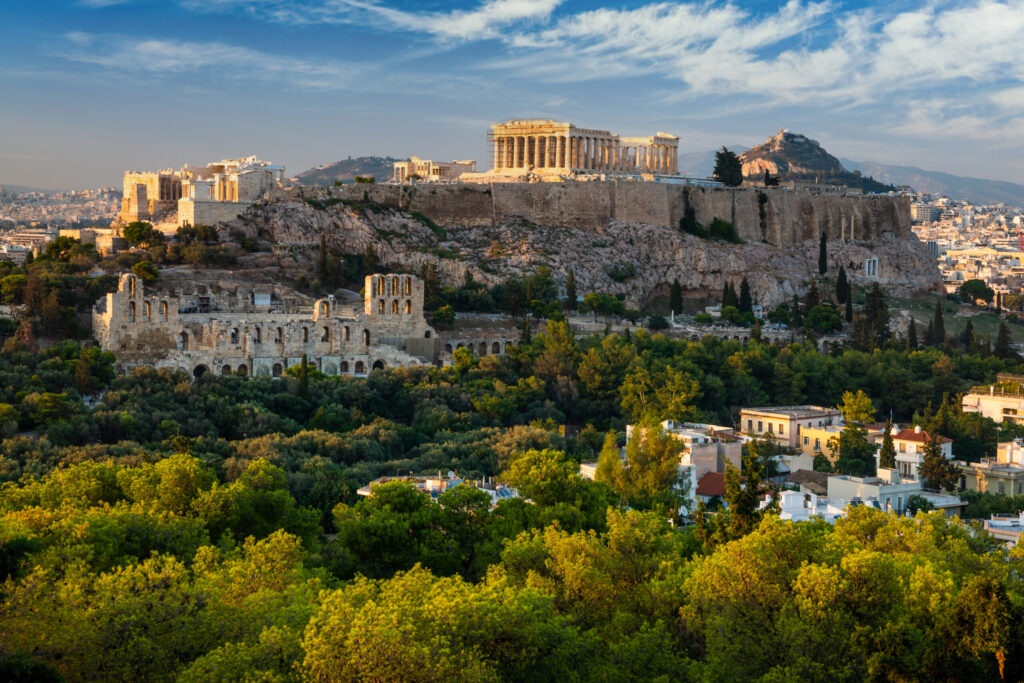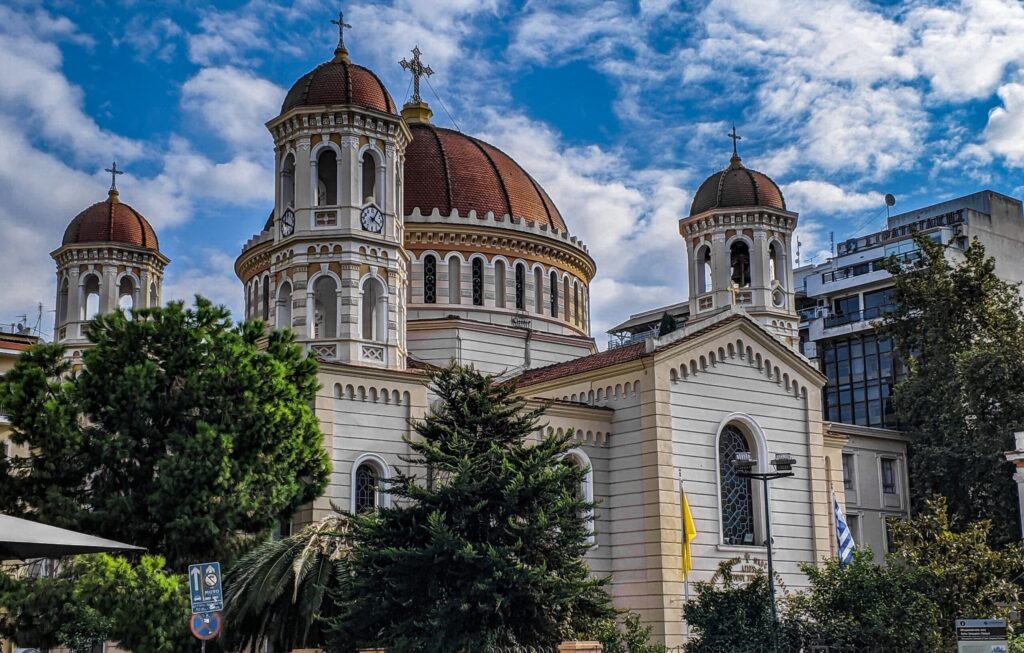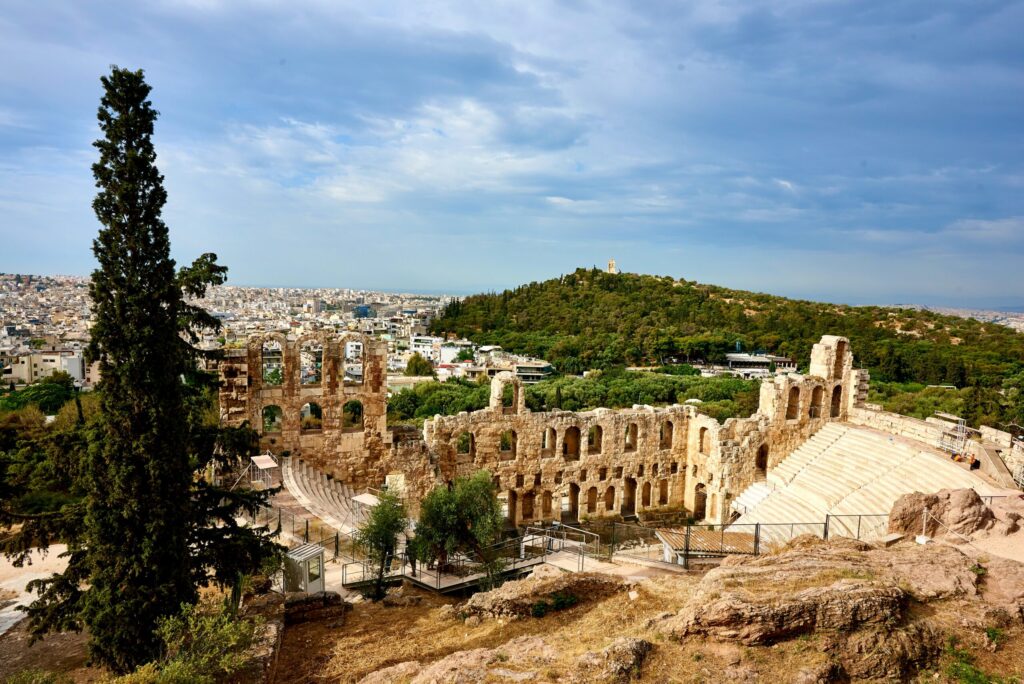Teach English in Greece
Greece is a beautiful country with a rich history and vibrant culture that makes it an ideal destination for English as a second language (ESL) teachers. With its stunning landscapes, warm climate, and friendly people, Greece is an attractive option for those who want to experience a different way of life while teaching English. It’s rich in architectural history and natural beauty, with breathtaking islands nestled throughout the coast line. Teachers will have the chance to visit ancient ruins, experience the vibrant nightlife in Athens, or relax on the stunning beaches of Crete. It doesn’t matter what time of year it is, Teaching English in Greece will always be a popular location for any TESOL Teacher. It’s time to discover the cradle of western civilization and philosophy.
Popular Cities
Athens

Scenic panoramic view of Acropolis in Athens, Greece at sunrise.
Athens is the capital of Greece and is home to some of the country’s most iconic landmarks, including the Acropolis, the Parthenon, and the Olympic Stadium. It is a vibrant city that is steeped in history and offers a wide range of opportunities for ESL teachers. With a large expat community and numerous language schools, Athens is an ideal place for those who are looking for a bustling city life.
- Visit the Acropolis and the Parthenon – The Acropolis is a hilltop citadel that is home to several ancient ruins, including the Parthenon. This iconic temple is considered one of the finest examples of ancient Greek architecture and provides a stunning view of the city.
- Explore the National Archaeological Museum – This museum is home to one of the largest collections of ancient Greek artifacts and is a must-visit for anyone interested in the history and culture of Greece.
- Stroll through Plaka – Plaka is a charming neighborhood in the heart of Athens that is known for its narrow streets, traditional tavernas, and vibrant atmosphere. It is a great place to relax and experience local life in Athens.
- Visit the Ancient Agora – The Ancient Agora was the center of public life in ancient Athens and is now an archaeological site that offers a glimpse into the city’s rich history.
- Enjoy a sunset view from the Lycabettus Hill – This hill provides one of the best views of the city and is a popular spot to watch the sunset over Athens. You can take a cable car to the top or hike up the hill for a more scenic experience.
Thessaloniki

Saint Gregory Palamas Holy Metropolitan Church in Thessaloniki
Thessaloniki is the second largest city in Greece and is known for its rich cultural heritage, nightlife, and delicious food. This city is a hub for art and music and is home to several universities, making it an ideal destination for ESL teachers who are looking for a more youthful and energetic environment.
- Explore the Byzantine Walls and Castle – The Byzantine walls and castle offer a glimpse into the city’s rich history and provide stunning views of the surrounding area.
- Visit the White Tower – This iconic tower is one of Thessaloniki’s most recognizable landmarks and has a rich history as a prison and museum.
- Stroll through the Ladadika neighborhood – Ladadika is a historic neighborhood that was once home to the city’s oil merchants. Today, it is a lively area filled with tavernas, cafes, and shops.
- Explore the Archaeological Museum of Thessaloniki – This museum houses a collection of artifacts from ancient Greece, including mosaics and sculptures, and is a must-visit for anyone interested in the history of the region.
- Take a stroll along the Thessaloniki Waterfront – The Thessaloniki waterfront is a popular destination for locals and tourists alike and offers stunning views of the city and the Aegean Sea. It’s a great place to relax and watch the world go by.
Crete

Top sea view of the beach from the fortress, Gramvousa, Crete Island, Greece
Crete is the largest of the Greek islands and is renowned for its pristine beaches, lush landscapes, and delicious food. It is a popular destination for tourists and offers a more relaxed pace of life compared to Athens and Thessaloniki. For ESL teachers who are looking for a quieter and more serene environment, Crete is an excellent option.
- Visit the Palace of Knossos – The Palace of Knossos is an ancient Minoan palace that dates back to the Bronze Age. It is one of the most important archaeological sites in Greece and offers a glimpse into the island’s rich history.
- Relax on a beach – Crete is home to some of the most stunning beaches in Greece, including Elafonisi Beach and Balos Beach. Take a dip in the crystal-clear waters, work on your tan, or simply enjoy the views.
- Explore the city of Chania – Chania is a charming port city that is known for its Venetian harbor, old town, and traditional architecture. It is a great place to relax and experience local life in Crete.
- Visit the Samaria Gorge – The Samaria Gorge is a stunning natural canyon that is one of the most popular hiking destinations in Greece. The hike takes you through a rugged landscape filled with beauty and wildlife.
- Taste the local cuisine – Crete is famous for its delicious cuisine, which is based on fresh ingredients, including olive oil, herbs, and local seafood. Try some traditional dishes such as moussaka, dolmades, and tzatziki, and enjoy the flavors of this beautiful island.
These are just a few of the many stunning cities and islands that Greece has to offer while you’re teaching English and exploring the country.
These are just a few of the many stunning cities and islands that Greece has to offer while you’re teaching English and exploring the country.

Assorted Greek dishes: Moussaka, Grilled fish, Souvlaki, Greek salad, Steamed mussels with herbs, appetizers of Greece
Food
Greek cuisine is renowned for its healthy and flavorful dishes, including moussaka, tzatziki, and baklava. The food in Greece is largely influenced by the Mediterranean diet, which emphasizes fresh produce, olive oil, and whole grains. Greek cuisine is diverse and is based on regional and seasonal ingredients, making it a unique and delicious experience for ESL teachers
- Souvlaki – Souvlaki is a popular street food in Greece that consists of skewered and grilled meat, usually pork or chicken, served with pita bread and a variety of dipping sauces.
- Gyro – A gyro is similar to souvlaki, but instead of being skewered, the meat is cooked on a vertical rotisserie and served in a pita with vegetables and sauces.
- Greek Salad – Greek salad, also known as village salad, is a staple in Greek cuisine and is made with fresh ingredients such as tomatoes, cucumbers, onions, feta cheese, and Kalamata olives.
- Dolmades – Dolmades are stuffed grape leaves filled with a mixture of rice, herbs, and sometimes meat. They are a popular appetizer in Greece and are often served with tzatziki sauce.
- Baklava – Baklava is a sweet pastry made with layers of phyllo dough, chopped nuts, and a syrup or honey. It is a staple in Greek cuisine and is a popular dessert served at special occasions and festivals.
- Grilled Fish – Grilled fish is a staple in Greek cuisine, and it can be found on menus all over the country. Freshly caught fish is seasoned with lemon and olive oil, then grilled to perfection and served with a side of vegetables.
Culture

Oia Santorini, Greece
- Hospitality – Greeks are known for their warm and friendly hospitality, and they are always eager to welcome visitors into their homes and communities. They believe that it is their duty to show kindness and generosity to those who come to their country.
- Family – Family is at the heart of Greek culture, and it is considered one of the most important aspects of life. Greeks place a high value on close relationships with their relatives, and they often spend a great deal of time with their families.
- Food – Food is an important part of Greek culture, and the country is known for its delicious cuisine, which is based on the Mediterranean diet. Fresh produce, olive oil, and lean protein sources are staples of the Greek diet, and these ingredients are used to create a variety of healthy and flavorful dishes.
- Religion – Religion plays a significant role in Greek culture, and the majority of Greeks are members of the Greek Orthodox Church. Religion is an important part of daily life for many Greeks, and it is celebrated through various rituals, traditions, and holidays.
- Festivals and Celebrations – Greeks love to celebrate, and they have a long history of hosting a variety of festivals and celebrations throughout the year. From religious holidays to cultural events, Greeks know how to have a good time, and they are always eager to share their traditions and customs with visitors.
- Arts – Greek arts have a rich history that spans thousands of years, and they continue to thrive today. From traditional pottery and weaving to contemporary visual arts, music, and dance, Greece offers a vibrant arts scene that visitors can enjoy.
- Sense of humor – Greeks have a strong sense of humor and they use it to cope with the challenges of daily life. They are known for their wit and quick-thinking, and they often use humor to diffuse tense situations and bring people together.

Greek Theater, Athens
Qualifications
To teach English in Greece, a degree is usually required by some language schools and institutes. An internationally recognised TESOL Certificate will be necessary.
Visa
To work as an English teacher in Greece, you will need to have a valid work visa. Most schools will help you obtain the correct visa and guide you through the process with visa assistance. Some students will originally enter on a 3-month holiday visa. The process of obtaining a work visa can vary depending on your country of origin, but generally, you will need to provide proof of your qualifications, a valid passport, and a criminal background check. It is important to check the specific requirements for each country and your language school for up-to-date advice.

Traditional town with colorful buildings in Kastelorizo Island, Greece
Get Started!
If you want an amazing destination for ESL teachers who are looking for a unique and enriching experience, then teach English in Greece. With its stunning landscapes, vibrant culture, and delicious food, Greece offers something for everyone. Whether you are looking to teach in Athens, Thessaloniki, or Crete, you are sure to find a warm and welcoming environment that will create a memorable teaching and living experience in Europe.


























